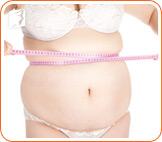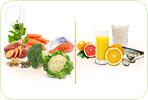Of all menopause symptoms women experience, weight gain is one of the most common, with up to 90% of women gaining up to fifteen pounds during the menopause transition.

While some weight gain during menopause is normal, excessive weight gain can negatively impact your health, increasing your risk of cardiovascular disease, breast cancer, diabetes, and many others.
However, menopausal weight gain can be avoided with long-term lifestyle changes, such as a eating a healthy diet and exercising regularly.
Below is a list of instructions on how to do your shopping to manage your weight gain.
What Food Should I Buy?
Even though weight gain can be discouraging, implementing a healthy lifestyle goes far beyond the number on your bathroom scale. Eating healthy food and exercising while not only help you shrink your waistline, but it can help you manage other menopause symptoms. While knowing what exercise routine works for you can be fairly straight forward, knowing what foods to purchase may require a bit more thought. Learn more about useful shopping tips for menopausal weight management:
No junk food

Having junk food around the house can trigger mood eating, whether out of boredom or sadness. It is very easy to eat an entire bag of potato chips in one sitting or to eat way too many cookies if it is all readily available. Instead, buy foods that are high in fiber, which will keep you full longer when you do snack.
Make a list and stick to it
Research recipes before you leave the house so you don't end up buying ingredients that you don't need. Having and sticking with your grocery list will not only prevent you from buying unnecessary snacks, it will help you save money at the store.
Buy snacking vegetables

Carrots, celery, cucumber and peppers are incredibly tasty, healthy options for snacking. If you cut them up as soon as you get home, they will be much handier to grab on the run, reducing your temptation to eat fast food later when you're on the go.
Buy a little at a time
Instead of buying one or two weeks' worth of fresh produce in one trip, buy just enough for a few days to avoid food waste. If your fruit is nearing the end of its life, make it into a smoothie or freeze it. Vegetables can be frozen or mixed into a stir fry or soup.
Recommendation
During menopause, weight gain accumulates around the waist. Talk with your doctor about the different weight gain treatments. And remember not to go to extremes with your weight loss. Being underweight can lead to a number of health problems in the same way that being obese can. The key to achieving and maintaining good health is finding a balance.
Sources
- BMJ Group. "Menopause: What is it?" Patient Leaflet. 2007.
- Hutchinson, Susan M.D. "The Stages of a Woman's Life: Menstruation, Pregnancy, Nursing, Perimenopause, Menopause." November 2007.
- Love, Susan M.D. Menopause and Hormone Book. New York: Three Rivers Press, 2003.



